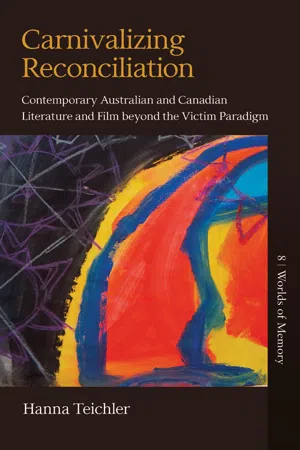
Carnivalizing Reconciliation
Contemporary Australian and Canadian Literature and Film beyond the Victim Paradigm
- 318 pages
- English
- PDF
- Available on iOS & Android
Carnivalizing Reconciliation
Contemporary Australian and Canadian Literature and Film beyond the Victim Paradigm
About this book
Transitional justice and national inquiries may be the most established means for coming to terms with traumatic legacies, but it is in the more subtle social and cultural processes of "memory work" that the pitfalls and promises of reconciliation are laid bare. This book analyzes, within the realms of literature and film, recent Australian and Canadian attempts to reconcile with Indigenous populations in the wake of forced child removal. As Hanna Teichler demonstrates, their systematic emphasis on the subjectivity of the victim is problematic, reproducing simplistic narratives and identities defined by victimization. Such fictions of reconciliation venture beyond simplistic narratives and identities defined by victimization, offering new opportunities for confronting painful histories.
Frequently asked questions
- Essential is ideal for learners and professionals who enjoy exploring a wide range of subjects. Access the Essential Library with 800,000+ trusted titles and best-sellers across business, personal growth, and the humanities. Includes unlimited reading time and Standard Read Aloud voice.
- Complete: Perfect for advanced learners and researchers needing full, unrestricted access. Unlock 1.4M+ books across hundreds of subjects, including academic and specialized titles. The Complete Plan also includes advanced features like Premium Read Aloud and Research Assistant.
Please note we cannot support devices running on iOS 13 and Android 7 or earlier. Learn more about using the app.
Information
Table of contents
- Carnivalizing Reconciliation
- Contents
- Acknowledgments
- Introduction: Carnivalizing Reconciliation
- Chapter 1 — Justice Through Storytelling? Australian and Canadian Reconciliation and the Victim Paradigm
- Chapter 2 — Carnivalizing Reconciliation: Beyond the Victim Paradigm
- Chapter 3 — Beyond the Partisan Divide: Transcultural Recalibrations of National Myths in Joseph Boyden’s Three Day Road and Gail Jones’s Sorry
- Chapter 4 — “Double Visions”: Intimate Enemies and Magic Figures in Kim Scott’s Benang and Tomson Highway’s Kiss of the Fur Queen
- Chapter 5 — From Victimology to Empowerment? Zacharias Kunuk’s Atanarjuat and Baz Luhrmann’s Australia
- Conclusion: Fictions of Reconciliation
- Bibliography
- Index